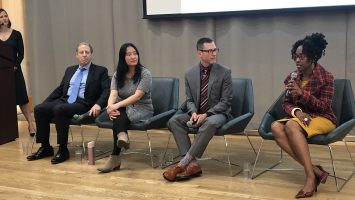
A new $3 million grant from the National Science Foundation (NSF) will help Arizona State University launch a graduate research training program called “Citizen Centered Smart Cities and Smart Living.” The program will start with 24 master’s and 14 doctoral students and aims to take an interdisciplinary approach to understanding and developing smart cities with individual citizens as the focus.
“Our project will prepare students to become the engineers, scientists, entrepreneurs and policymakers who lead this growing field and shape the future of smart cities in a human-centric way,” said Sethuraman “Panch” Panchanathan, principal investigator on the project and director of ASU’s Center for Cognitive Ubiquitous Computing.
The project will call upon multiple co-principal investigators to bring unique perspectives to the topic:
- Ann McKenna, Director of the Polytechnic School, brings expertise in engineering education;
- Gail-Joon Ahn, a professor in the School of Computing, Informatics, and Decision Systems Engineering, focuses on cybersecurity;
- Ram Pendyala, a professor in the School of Sustainable Engineering and the Built Environment, specializes in transportation systems; and,
- Cynthia Selin, an associate professor in the School for the Future of Innovation in Society, focuses on ethics and technology in citizen engagement.
“What does a citizen need from a smart city? How could they benefit from a smart city? And how can they engage better in smart cities? There is a lot of focus on citizen awareness, engagement and education as part of this project we’ve put together,” said Troy McDaniel, an ASU assistant research professor who is providing expertise on human-computer interaction, assistive technology, accessibility and inclusion to the project.
Students will engage in cross-disciplinary courses and research projects, immersive internships with external partners, service learning opportunities, entrepreneur education, and communication skills training. They will also be able to use Sun Devil Stadium, a recently converted smart stadium, and other local test beds for research.
“This funding provides us a tremendous opportunity to advance several of ASU’s fundamental values, including our commitment to access, hands-on experiential learning, interdisciplinary collaboration and an entrepreneurial mindset,” said Panchanathan. “This approach allows us to cultivate great ideas and solve real-world challenges.”


